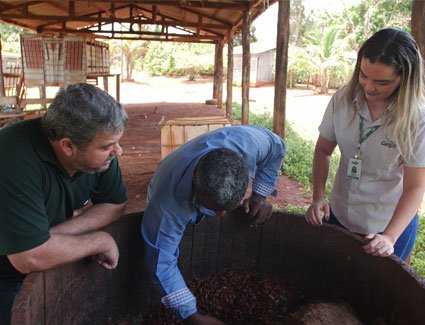SÃO PAULO, Brazil – Cargill, in partnership with the non-profit organization Imaflora, is implementing two projects to support cocoa producers in Pará that are designed to increase their productivity through environmental conservation actions and good agricultural practices.
The projects are expected to help 150 families in São Felix do Xingu, who are part of the Cooperative Alternativa Mista dos Pequenos Produtores do Alto Xingu (CAMPPAX), by restoring approximately 740 acres of degraded farmland to increase and diversify revenues of farmers.
In addition, in Medicilândia, more than 50 producers will be trained on best-in-class cultivation techniques and efficient use of farming products to meet the standards of sustainable cocoa production.
The initiatives are in line with Cargill’s global sustainability goals, focused on the economic and social prosperity of farmers and the protection of forests.
Imaflora is focused on strengthening the cocoa production chain, encouraging education and supporting public policies to combat illegal deforestation. Cargill’s financial and management support is essential to strengthen the actions associated with the production chain and environmental sustainability. “We have been operating in São Felix do Xingu for ten years, and we see that these projects are very important for improving production conditions while restoring degraded areas, with the help of agriculture experts as resources,” says Eduardo Trevisan Gonçalves, project manager at Imaflora.
Cargill is focusing its efforts at the start of the supply chain because it is where some of the most pressing challenges originate. It is also where working together can make the greatest impact. “Everything always comes down to how we create lasting benefits for cocoa farmers, their families and communities. We want to empower them to own their futures and achieve their own business success. This aligns with our global sustainability strategy and is part of Cargill’s Protect Our Planet Strategic Action Plan,” explains Laerte Moraes, managing director Cargill Cocoa & Chocolate in Brazil.
Cocoa is a species native to the Amazon, and when combined with other native species, offers an economically viable system that increases the resilience of cocoa while promoting plant cover on agricultural land and conserving biodiversity.
“We believe in a collective approach in which everyone has a role to play, and we recognize the value of sharing best practice, developing initiatives that complement other people’s activities and working closely with key partners who know the local context and culture. It is by working together, around projects like Floresta Produtiva and Farmer Coaching, that we will help farmers to prosper as we increase the productivity of sustainable cocoa in Pará,” added Laerte Moraes.
The Floresta Produtiva (Productive Forest) project involves 150 producers supporting the implementation of Agroforestry Systems (SAFs) and the environmental sustainability of the properties under the Brazilian Forest Code. It provides seedlings of native species from the Amazon biome and farming products to produce cocoa seedlings; technical assistance to producers for the elaboration of the Rural Environmental Registry (CAR); Recovery Plan for Degraded and Altered Areas, and training of producers in environmental management.
The Farmer Coaching project includes training more than 50 producers to become ambassadors of good practices in sustainable cocoa production throughout the region. Among the techniques taught are pruning instructions, efficient use of fertilizers, disease control, fermentation, work safety, correct application of farming products and use of individual safety equipment.
Both projects are part of the Cargill Cocoa Promise, our commitment to enabling farmers and their communities to achieve better incomes and living standards, launched in 2012. “As with all Cargill Cocoa Promise initiatives, our operations in Brazil aim to increase social, economic and environmental impact of small cocoa producers and their families to secure the future of the cocoa chain in a more responsible and sustainable way,” emphasized Moraes.


















